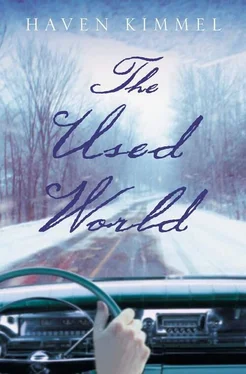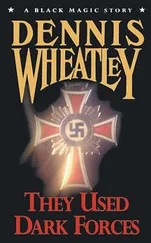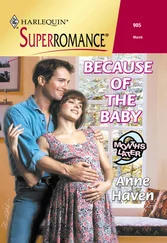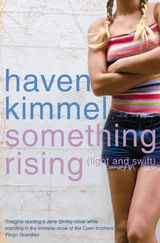Amos tapped his fingers on his desk, smiled at her. She smiled back but didn’t speak. The crease in her blue jeans was sharp between her fingers. She left it, and began instead to spin the rose gold signet ring on her pinkie. It had been her father’s, but his interlocking cursive initials, BLM, were indecipherable now, florid to begin with and worn away with time.
“Can I say something?” Amos asked, startling Claudia.
“Please do.”
“I talk to people like this every day. I spend far more time in pastoral care than in delivering sermons. That—podium time—is the least of my job. So I’m happy to hear anything you have to say. Except maybe about the weather, since I get that everywhere I go.”
Claudia nodded. “It’s going to snow.”
“Sure looks like it.”
What did she have to say? She could tell him that she spent every morning sitting at the kitchen table, staring out the window at the English gardening cottage her father had built for her mother, Ludie—stared at it through every season, and also at the clothesline traversing the scene, unused since her mother’s death. She could say that the line itself, the black underscoring of horizontality, had become a burden to her for reasons she could not explain. The sight of the yard in spring and summer, when the fruit was on Ludie’s pawpaw tree, was no longer manageable. Or she could say that looking at the gardening shed, she had realized that the world is divided—perhaps not equally or neatly—into two sorts: those who would watch the shed fall down and those who would shore it up. In addition, there were those who, after the fall of the shed, would raze the site and install a prefabricated something or other, and those who would grow increasingly attached to the pile of rubble. Claudia was, she was just beginning to understand, the sort who might let it fall, love it as she did, as attached to it as she was. She would let it fall and stay there as she surveyed—each morning and with a bland sort of interest—the ivy creeping up over the lacy wrought-iron fence on either side of the front door, a family of house sparrows nesting under the collapsed roofline.
“I suppose I have a problem,” she said, twirling her father’s ring.
“Yes?”
“It has to do with the death of my mother.”
Amos waited. “Three years ago?”
“That’s right.” Claudia nodded. “I can’t say more than that.”
Amos aligned a pen on his blotter. Even in a white T-shirt and gray sweater he appeared to Claudia a timeless man; he might have been a circuit rider or a member of Lincoln’s cabinet, with his salt-and-pepper hair, his small round glasses hooked with mechanical grace around his ears. “I met your mother once,” he said.
“I—you did?”
“Yes, it was just after I moved here to Haddington. She and Beulah Baker showed up at my door just before noon one day and asked if they could take me to MCL Cafeteria for lunch. They were very welcoming.”
“I had no idea.” It had happened a few times in the past few years that Claudia would find a note in her mother’s secretary, or the sound of Ludie’s voice on an unlabeled cassette tape, and it felt like discovering in an attic the lost chapter of a favorite novel, one she thought she knew.
“Salt of the earth. I liked her very much.”
“She and Beulah were friends for a long time. Though I didn’t see much of Beulah after my mother died, of course.” She didn’t need to say because Beulah’s daughter and son-in-law died, and there were the orphaned daughters; Amos knew all too well. “I started coming to your church because of her, because she had spoken highly of you from the beginning.”
“Are you close to her again?”
“No—I—I find her unreachable.” What she meant was I am unreachable. “She’s friendly to me, but so frail she seems to be, I don’t know. In another country.” That was correct, that was what she meant: the country before, or after. There was Beulah in Ludie’s kitchen twenty-five years ago, baking Apple Brown Betty in old soup cans, then wrapping the loaves in foil and tying them with ribbons, fifty loaves at a time, to go in the Christmas boxes left on the steps of the poor. Beulah now, pushing her wheeled walker down the aisle at church, nothing and no one of interest to her but the remains of her family: her grandchildren; Amos and his wife, Langston. Nothing else.
“There is something missing in my life,” Claudia said, more urgently than she meant to. “I wake up every day and it’s the first thing I notice. I wake up in the middle of the night, actually. Sometimes the hole in the day is big, it seems to cover everything, and sometimes it’s like a series of pinpricks.”
Amos leaned forward, listening.
“I’m not depressed, though. I’m really quite well.”
“Are you”—Amos hesitated—“are you lonely?”
Claudia nearly laughed aloud. Loneliness, she suspected, was a category of experience that existed solely in relation to its opposite. Given that she never felt the latter, she could hardly be afflicted with the former.
“Loneliness is fascinating,” Amos said. “I see people all the time who say they are lonely but it’s a code word for something else. They can’t recover from their childhood damage, or they’ve decided they hate their wives. I don’t know, I had lunch with a man once who kept complaining about his soup. It was too hot, it was too salty. I remember him putting his spoon down next to the bowl with a practiced…like a slow, theatrical gesture of disgust. The soup was a personal affront to him. I knew on another day it would be something else—he would have been slighted by a clerk somewhere, or the rain would fall just on him, at just the wrong time.”
“Wait, go back—code for what?”
“Excuse me?”
“Loneliness is a code word for what?”
Amos shrugged. “That’s for you to decide, I guess.”
They sat in silence a few more minutes, Claudia now fully aware of all the reasons she had never sought counseling before. She glanced at the clock on the wall behind Amos’s desk and realized she needed to get to work. “I need to go,” she said, standing up. Amos stood, too, and for Claudia it was one of those rare occasions when she could look another person in the eye.
They shook hands and Amos said, smiling as if they were old friends, “It was a pleasure. Come see me again anytime.”
Salt of the earth. All through the day Claudia considered the phrase as it applied to Ludie, and to her father, Bertram. She didn’t know the provenance, but assumed the words had something to do with Lot’s wife, who could not help but turn and look back at the home she was losing, the friends, the family, the—who knew what all?—button collection, and so was struck down by the same avenging angels who had torched Sodom and Gomorrah. Ludie would not have looked back, of that Claudia was certain. They were plain country people, her parents, upheld all the conservative values that marked the Midwest like a scar. But they had been canny, too—they had played the game by the rules as they understood them. They were insured to the heavens, and when they died they left Claudia a mortgage-free house, and a payout on their individual policies that meant she would never want for anything. For her whole, long life, they seemed to be saying, Claudia would never have to leave the safety of the nest.
Ten days before Christmas and the Used World Emporium was busy, as it had been the whole month of December. Claudia thought about her mother and Beulah Baker showing up on Amos Townsend’s doorstep and wished, as she wished every day, that she could witness, or better yet, inhabit, any given moment when Ludie was alive. Claudia didn’t need to speak to her, didn’t need to stand in her mother’s attention; she would take anything, any day or hour, just to see Ludie’s hands again, or to watch her tie behind her back (so quickly) the pale blue apron with the red pocket and crooked hem. She thought of these things as she moved a walnut breakfront from booth #37 into the waiting, borrowed truck of a professor and his much-too-young wife, probably a second or third spouse for the distinguished man, and not the last. She carried out boxes of Blue Willow dishes (it multiplied in a frightful way, Blue Willow; 90 percent of what they sold was counterfeit, but in the Used World the sacred rule was Buyer beware ). Over the course of the day she wrapped and moved framed Maxfield Parrish advertisements; an oak pie safe with doors of tin pierced into patterns of snowflakes; a spinning wheel Hazel had thought would never sell. She watched the clientele come and go, and they were a specific lot: the faculty and staff from across the river filtered in all day, those who knew nothing about antiques except the surface and the cache. The gay couples who were gentrifying the historic district, well-groomed men who walked apart from each other, their gimlet eyes trained to see exactly the right shade of maroon on a velvet love seat, a pattern of lilies on a cup and saucer that matched their heirloom hand towels. And behind them the crusty, retired farm folk who knew the age and value of every butter churn and cast iron garden table, who silently perused the goods and would not pay the ticket price for anything. Claudia watched them all, this self-selected group of shoppers, aware that just half a mile down James Whitcomb Riley Avenue, the Kmart was doing a bustling business in every other sort of gift, to every other kind of person, and she was grateful to work where she worked, at least this Christmas season. She moved furniture, took off and put on her coat a dozen times, thought about Ludie and Beulah, and she thought about loneliness, a code for something. Everyone she encountered stared at her at least a beat too long, then talked about the weather to disguise it. She nodded in agreement, as the sky grew dense and pearl-gray.
Читать дальше












